|
|
|
Sort Order |
|
|
|
Items / Page
|
|
|
|
|
|
|
| Srl | Item |
| 1 |
ID:
153268
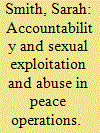

|
|
|
|
|
| Summary/Abstract |
In March 2016, the United Nations Security Council adopted its first resolution devoted entirely to the prevention of peacekeeper sexual exploitation and abuse (SEA) in peace operations. This article examines resolution 2272 by drawing on past practice and the perspective of those at mission sites—namely, Timor-Leste—arguing that the mechanism it establishes—repatriation—is limited in its capacity to prevent SEA and provide justice outcomes. The article demonstrates the pervasive sense of powerlessness regarding SEA and the impunity of those who do perpetrate SEA. The article further situates the issue of SEA by peacekeepers in the post-conflict (gendered) context in which it occurs, arguing that the resolution does not challenge the underlying norms and gendered relations of power that underpin peace operations. Instead, the resolution frames SEA as chiefly an issue of embarrassment for the United Nations and makes scant mention of the populations that peace operations are mandated to protect, as well as the perspectives and needs of victims of SEA.
|
|
|
|
|
|
|
|
|
|
|
|
|
|
|
|
| 2 |
ID:
169364
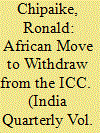

|
|
|
|
|
| Summary/Abstract |
Africa’s relationship with the International Criminal Court (ICC) has been strained over the past few years. Threats by a number of African states to withdraw from the ICC’s jurisdiction have marked a crescendo in the strained relationship. This study looks at the issues surrounding the proposed or threatened mass withdrawal by African countries and the implications for peace and justice in the African continent. Utilising interviews with a cross section of key informants including members of the African diplomatic community resident in Zimbabwe, this study highlights that it is difficult for African states to withdraw en masse since not all states are agreeable to this stance. The study further highlights that although the ICC is not a perfect institution, it is the only alternative court of last resort that can deal with human rights and international humanitarian law violations as well as impunity in the continent. The proposed African Court of Justice and Human Rights (ACJHR) has not yet taken root owing to a shortage of adequate ratifications of the protocol establishing it. Thus, although concerns of unfair targeting of African leaders and individuals by the ICC could be considered valid, African states need to find a way of establishing a cordial relationship with the ICC to ensure the protection of individual rights while they establish regional institutions to deal with cases currently being referred to the ICC.
|
|
|
|
|
|
|
|
|
|
|
|
|
|
|
|
| 3 |
ID:
175109
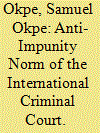

|
|
|
|
|
| Summary/Abstract |
In recent years, the position of the International Criminal Court (ICC) in Africa has become an issue of contention. Through the African Union (AU), African leaders have expressed their concern in relation to the principle of impunity and self-sovereignty of African nations. The AU asserts fiercely that the influence of the ICC is overwhelming on the African continent; therefore, African leaders clamor for an amendment to the court or even a total withdrawal. I argue that the change of relationship initiated by the AU is not only selfish but also unequivocally harmful to the tenets of justice, law and order. By way of a vast exploration of data (internet sources, official government records, print sources and online interviews), this study reiterates the importance of the anti-impunity norm of the ICC as an instrument of equity, especially when African leaders are involved.
|
|
|
|
|
|
|
|
|
|
|
|
|
|
|
|
| 4 |
ID:
141777
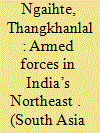

|
|
|
|
|
| Summary/Abstract |
More than 60 years of de facto military rule through the Armed Forces (Special Powers) Act (AFSPA) 1958 in India’s northeast has engendered neither stability nor peace. Problems regarding the impunity of violence and crime, official corruption and the virtual collapse of the rule of law continue, but the Act remains in operation. This article attempts to reframe the debates on the AFSPA in terms of its necessity by turning the necessity argument on its head and arguing that the secessionist insurgencies which were originally used to justify the Act have actually long ceased to exist. Since the principle of existential necessity that provided a fig leaf to the Act no longer applies, its continued application needs to be re-examined. It is further argued that the Indian military’s increasing clout in internal security policy-making may have grave implications for Indian democracy itself, with negative impacts on the rule of law and in relation to safe inclusion strategies for India’s northeast.
|
|
|
|
|
|
|
|
|
|
|
|
|
|
|
|
| 5 |
ID:
123161
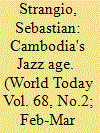

|
|
|
| 6 |
ID:
147702
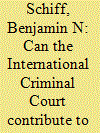

|
|
|
|
|
| Summary/Abstract |
The Responsibility to Protect (R2P) norm asserts that states have duties beyond their borders to help avoid, respond to, and prevent recurrence of circumstances that produce massive human rights violations. Actions undertaken to implement those duties can include aid, reform, or more muscular involvements. The need for such engagement implies that the target state’s government is losing or has lost its legitimacy. Labeling by the International Criminal Court (ICC) of a conflict as a ‘situation’ under its purview asserts that large-scale crimes are likely taking place for which individuals should be held accountable. This should trigger R2P considerations. However, the fit between R2P and the ICC is uncomfortable. Although the ICC may appear a useful tool for R2P, forays into the politics of R2P by the ICC are undertaken at its peril. Moreover, so far, the ICC has not clearly had positive effects upon conflict. While the ICC can be idealized as a contributor to R2P, coordination is formally non-existent and the Court’s protection effects are ambiguous.
|
|
|
|
|
|
|
|
|
|
|
|
|
|
|
|
| 7 |
ID:
186337


|
|
|
|
|
| Summary/Abstract |
“Ending impunity” is often heralded as the key mechanism for stopping rape in war. Yet, little systematic evidence or analyses exist of the relationship between impunity (or lack thereof) and sexual violence. We argue that amnesties signal impunity and permissiveness for sexual violence, which can perpetuate and instigate more sexual violence by rebels. Trials, on the other hand, signal a nonzero probability of punishment, which could have a deterrent effect. Studying all intrastate armed conflicts in the period 1989–2011, we find in line with the impunity signal that amnesties are associated with sexual violence by rebels, but we are not able to demonstrate a deterrent effect of trials. While the study prevents us from conclusively saying that ending impunity would be an effective policy tool to stop sexual violence in war, the association between amnesties and subsequent sexual violence is a testament to the perils of impunity.
|
|
|
|
|
|
|
|
|
|
|
|
|
|
|
|
| 8 |
ID:
193570
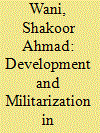

|
|
|
|
|
| Summary/Abstract |
This article examines the interplay of development, militarization and culture of impunity in Balochistan. It contends that the State’s pursuit of large-scale infrastructure projects is intensifying the conflict. Balochistan has increasingly been positioned as the potential fulcrum of Pakistan’s economic revival due to its vast, untapped resources and significant Chinese investments. While this vision seems promising, it has heightened Baloch anxieties and resistance. Large development initiatives bring about socio-economic disruptions, fuelling existing anti-State sentiment. The article argues that the imperative to protect expanding economic assets has enabled the region’s further militarization, engendering an environment wherein the security-intelligence apparatus employs force inordinately and arbitrarily with impunity.
|
|
|
|
|
|
|
|
|
|
|
|
|
|
|
|
| 9 |
ID:
193477
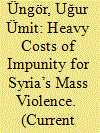

|
|
|
|
|
| Summary/Abstract |
After more than a decade of armed conflict in Syria, few perpetrators of mass violence have been held accountable for their actions. The Assad regime is the prime sponsor of impunity for these human rights abuses, but global and regional powers also bear responsibility for allowing the perpetuation of atrocities.
|
|
|
|
|
|
|
|
|
|
|
|
|
|
|
|
| 10 |
ID:
139443
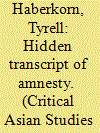

|
|
|
|
|
| Summary/Abstract |
There were two, not one, amnesty laws passed in relation to the 6 October 1976 massacre at Thammasat University and coup in Thailand. The first amnesty law, passed on 24 December 1976, legalized the coup and prevented those who created the conditions for the coup and seized power on the evening of 6 October from being held to account. The second amnesty law, passed on 16 September 1978, freed eighteen student activists still undergoing criminal prosecution and dismissed the charges against them. Although neither amnesty mentioned the massacre, the urgency of producing and then safeguarding impunity for the state and para-state actors behind the violence at Thammasat was the absent presence in both laws. Combining a close reading of both laws with examination of archival documents about the drafting of the first amnesty law and court and other records related to the second, this article uncovers the hidden transcripts of both amnesty laws as a point of departure for examining questions about impunity, law, and history. First, what are the legal mechanics through which violent actors escape accountability? Second, what are the legal and political functions of amnesty when no crime has been committed? Third and finally, might accountability for past violence be possible, and if so, under what conditions? The answers to these questions illuminate how impunity was produced in the specific case of the 6 October 1976 massacre in Thailand as well as address broader concerns about impunity's role in state formation.
|
|
|
|
|
|
|
|
|
|
|
|
|
|
|
|
| 11 |
ID:
169411
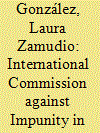

|
|
|
|
|
| Summary/Abstract |
A number of the studies on international intergovernmental organizations (IO s) rule out that they are autonomous or capable of self-directing their processes of change. The case of the International Commission against Impunity in Guatemala (CICIG) makes it possible to see precisely to what degree an IO is autonomous. Through documentary analysis and interviews with the leadership of CICIG, this article shows that the organization adjusted and reinterpreted its mandate as a result of a process of internal and autonomous decisions. This evidence contributes to the debate about the IO s as self-directed actors.
|
|
|
|
|
|
|
|
|
|
|
|
|
|
|
|
| 12 |
ID:
174367
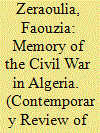

|
|
|
|
|
| Summary/Abstract |
The Algerian Civil War during the 1990s is considered to be one of the violent wars in the Arab world. For one decade, isolated from the international community, the country and its civilians suffered from extremism, radicalism, torture, and assassinations. Today, it is arguable that the memory of the Algerian Civil War played a pivotal role in producing the legitimacy of the political system and framing the citizens’ perceptions of the postwar regime before the current manifestations. Nevertheless, no field research has explored how that memory is represented and recalled by the people. Through analyzing the public narrative, surveying and examining the public platforms, and conversations dealing with the past civil war in Algeria, this article seeks to demonstrate how that violent past is remembered in the public arena, the emotions that have been accumulated from such experience and the lessons that have been learned by the people. In doing so, we use many examples from the Algerian manifestations after 22 February 2019, or what is called “the Algerian Hirak.”
|
|
|
|
|
|
|
|
|
|
|
|
|
|
|
|
| 13 |
ID:
154748
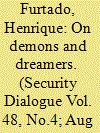

|
|
|
|
|
| Summary/Abstract |
Measures towards post-conflict or post-authoritarian justice have historically relied on the merging of the concepts of silence, violence and impunity in order to create a single promise of justice. Scholars and practitioners in the field usually defend a trifold agenda of breaking the silence about violations of human rights, denouncing systematic violence in the past and fighting impunity as the only way of ensuring that violence never happens again. This trope was mobilized in Brazil in 2014, when the report of the country’s National Truth Commission (CNV) was released. However, in the Brazilian case, truth-seeking also produced its own form of ‘silence’. Whereas the CNV commendably denounced 377 perpetrators as the ‘demons’ responsible for implementing a state of terror during the last dictatorship (1964–1985), it also created a depoliticized and victimized idea of leftist militants as mere dreamers who fought for liberty and democracy in the past. By representing leftist militants as freedom fighters, the CNV silenced their fundamental ideas (and actions) regarding the concept of revolutionary violence and its radical programme of structural change. In this article, I provide an explanation that connects the CNV’s ‘silencing’ of this political project to the unreflective merging between the concepts of silence, violence and impunity in the literature. Via a narrative analysis of the CNV’s report and a critique of transitional justice debates, I argue that the silence on the political project of the radical left in Brazil echoes transitional justice’s silence about the complexities of violence in general.
|
|
|
|
|
|
|
|
|
|
|
|
|
|
|
|
| 14 |
ID:
187340
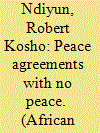

|
|
|
|
|
| Summary/Abstract |
Societies faced with authoritarian rule or conflict usually adopt different paths to peace. The course adopted by each community to guarantee stability determines the extent to which the sustainability of the peace can be assured. Every attempt to pacify a society should aim to prevent a relapse to conflict or authoritarian rule while considering the damage caused and sorting out measures to repair the harm. The history of military coups and conflicts in the Central African Republic (CAR) is well documented. Still, the attempted remedies have greatly side-lined the raison d’être of the responses in guaranteeing peace and preventing relapse to conflict. As the CAR remains politically and socially unstable, an analysis of the failure of peace agreements to ensure stability constitutes a field of inquiry that urgently necessitates a more profound investigation to save the country from recurrent hostilities and guarantee a peaceful society for the citizens. Peace includes an aspiration manifested by both the CAR authorities and non-state armed groups in the course of hostilities and on the negotiation table. Central Africans indicate an interest in peace, but such interest often manifested and materialised in peace agreements has barely been implemented.
|
|
|
|
|
|
|
|
|
|
|
|
|
|
|
|
| 15 |
ID:
157989
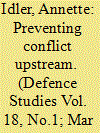

|
|
|
|
|
| Summary/Abstract |
This article explores how transnational borderlands matter for conflict prevention and, in particular, so-called upstream engagement, which aims to reduce threats to global stability and security that arise from the world’s increasing interconnectedness. Accounting for transnational borderlands in vulnerable regions is crucial for conflict prevention as pursued by the defence and security sector because borderlands are catalysts of the negative side of global interconnectedness: they are business hubs for transnational organised crime, sites of retreat for conflict actors, and safe havens for terrorists. The border areas’ proneness to impunity and the ability of violent non-state actors to govern these spaces illicitly contribute to the emergence of these characteristics. I therefore argue that upstream conflict prevention needs to do two things to address these risks: first, to overcome a national security approach centred on the borderline and instead acknowledge transnational security dynamics in borderlands on both sides of the border; second, to overcome the state-centred governance lens to also consider governance exerted by non-state actors. The article draws on empirical data from a six-year study including over a year of fieldwork in and on Colombia’s borderlands.
|
|
|
|
|
|
|
|
|
|
|
|
|
|
|
|
| 16 |
ID:
154699
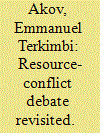

|
|
|
|
|
| Summary/Abstract |
The resource debate is easily discerned as part of the ongoing history of farmer–herdsman conflict in the North Central region of Nigeria. Scarcity theorists are adept at linking scarcity with the onset of livelihood conflict while on the other hand resource abundance pundits insist it is profusion and not scarcity that impels conflict. This article traverses these wrangles and proceeds to downplay the resource polemic altogether. It is proposed that the resource debate, despite its profoundness, presents a narrow reading of farmer–herdsman clashes in Nigeria’s North Central region. It is suggested that a number of other factors, including elite land grabbing, ethno-religious identity construction, weak state capabilities, the citizenship question, corrupt traditional institutions, the lack of an effective land tenure system and a widespread culture of impunity, make for better readings of the conflict. Owing to the negative impacts of the conflict on state and society, it is recommended that the state in Nigeria should commit itself to addressing the citizenship question, strengthening the capabilities of security institutions, extirpating the culture of impunity and revaluing its policy on land redistribution.
|
|
|
|
|
|
|
|
|
|
|
|
|
|
|
|
|
|
|
|
|